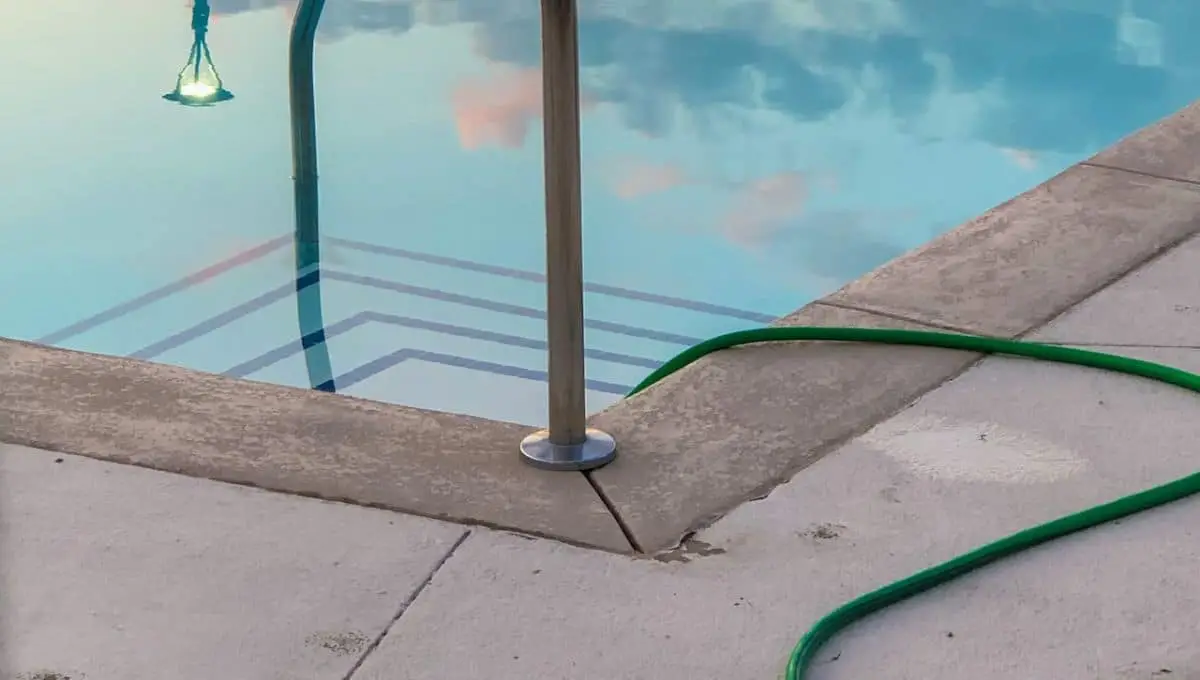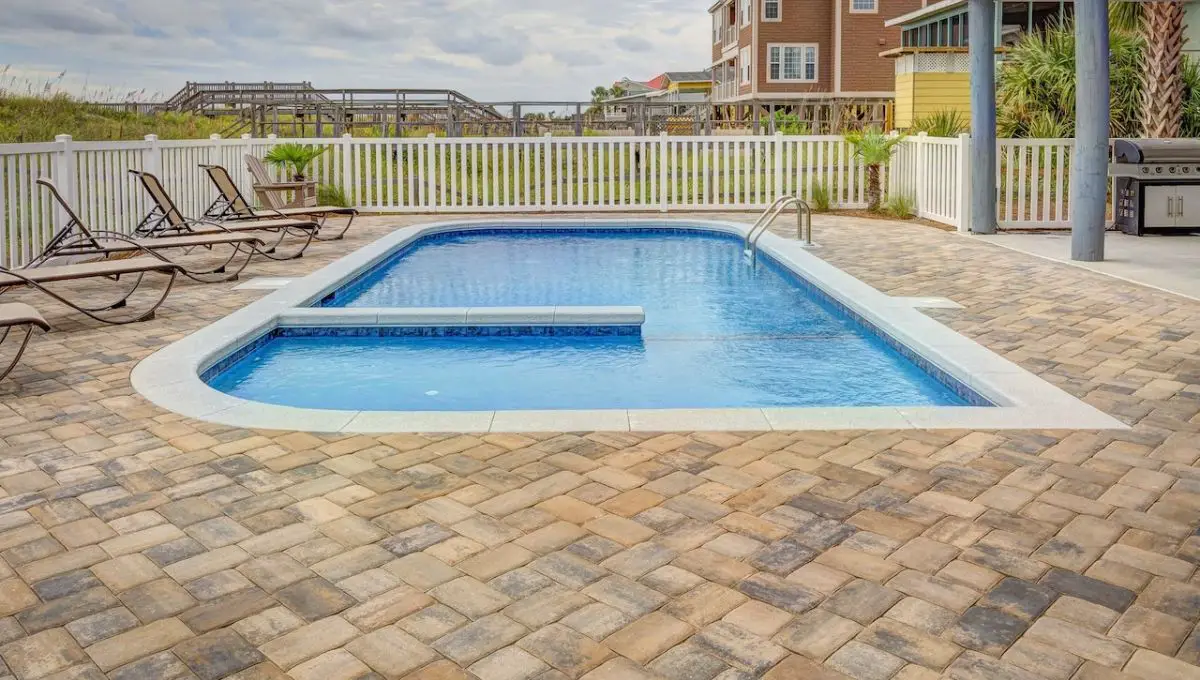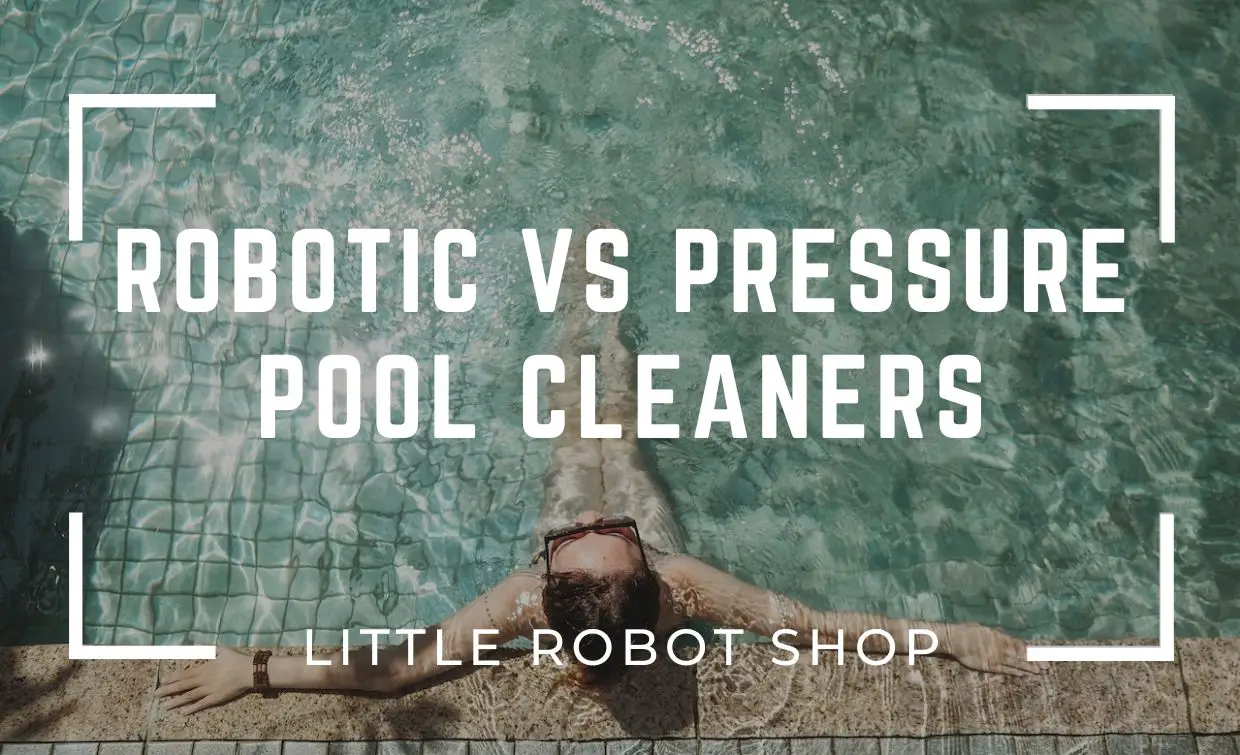It’s a hot summer day, the sun is shining, and all you want to do is dive into the refreshing coolness of your swimming pool. But then you remember the pool needs cleaning. We’ve all been there, right? Scrubbing the pool’s walls, vacuuming the floor, and fishing out those pesky leaves and debris – it’s a real chore.
That’s where automatic pool cleaners come in. These nifty gadgets have been game-changers for pool owners, turning what was once a laborious task into something that’s practically hands-off. You might come across two main types of automatic pool cleaners in your research: robotic pool cleaners and pressure pool cleaners.
Each type of cleaner has its benefits and drawbacks, and what works best for one person may not necessarily be the best fit for another. That’s why I want to help you navigate the world of automated pool cleaning. I’ve been through the trial and error of testing different models and gathered my experiences to share with you.
In this article, we will dive into the world of automated pool cleaners. We’ll explore robotic and pressure pool cleaners’ features, benefits, and drawbacks. By understanding these pool cleaners, you’ll be well-equipped to find the perfect solution for your pool maintenance needs, saving you time, reducing stress, and ensuring a cleaner pool.
If you want to learn more about robotic pool cleaners, check out our comprehensive buyer’s guide. But for now, let’s dive in, shall we?
You may also like:
*The product links in this post are affiliate links, which means that if you purchase after following one, I make a small commission from the sale at no additional cost to you. Please see our disclosure page for more information.
Quick answer: Choosing the right pool cleaner
If you’re looking for a quick answer on which pool cleaner to choose, here are some recommendations based on your specific needs:
- Budget-conscious pool owners: Consider a pressure pool cleaner for an affordable option.
- Medium-to-large pools with advanced cleaning needs: Opt for a robotic pool cleaner for advanced features and thorough cleaning.
- Pools located near trees or with high debris: Look for a pool cleaner with powerful debris removal capabilities.
- Delicate or specialty pool surfaces: Choose a pool cleaner specifically designed for delicate surfaces like vinyl or fibreglass.
- Complex pool shapes and hard-to-reach areas: Select a pool cleaner with advanced manoeuvrability for navigating tight corners and walls.
While these recommendations provide a quick overview, we encourage you to keep reading for a more in-depth analysis and practical examples of popular pool cleaners. Understanding the features, benefits, and considerations will help you make a well-informed decision that best suits your pool cleaning needs.
Understanding pool cleaners
So let’s start with the basics. What are automated pool cleaners, and how do they work?
Automated pool cleaners are essentially underwater vacuum cleaners for your pool. They’re designed to take care of the tedious task of removing leaves, dirt and other debris that inevitably ends up in your pool. If you’re thinking about the Roomba zipping around your living room floor, you’re not too far off! The concept is quite similar, just adapted for a watery environment.
You just set up the pool cleaner in your pool and let it run its cleaning cycle. As it moves around, it sucks up debris, trapping it in a collection bag or compartment. This keeps your pool clean and clear without you having to lift a finger. Sounds pretty great, right?
Now, while all automated pool cleaners operate on this basic principle, the specifics can vary depending on whether you’re dealing with a robotic or pressure pool cleaner. Each type has its unique way of moving around the pool and collecting debris. These differences can have significant implications for their performance and suitability for different types of pools. So let’s take a closer look at these two types of cleaners, starting with robotic pool cleaners.
Robotic pool cleaners: A tech-savvy solution

If you’re the kind of person who loves cutting-edge technology and smart solutions, then robotic pool cleaners might be right up your alley. These marvels of modern technology aren’t just glorified pool vacuums. They’re intelligently designed machines equipped with various features that make pool cleaning a breeze.
They come with an ultra-powerful electric motor that propels the cleaner and vacuums debris off your pool’s surfaces. They can care for the floor, walls, and sometimes even the steps of your swimming pool. And for those stubborn patches of dirt and algae? Robotic pool cleaners have rotating scrubbing brushes to handle even the toughest cleaning jobs.
But the real beauty of these cleaners lies in their smart features. Some models have electronic sensors that map out your pool to determine the quickest and most efficient cleaning route. Others offer remote control capabilities, allowing you to steer the cleaner to specific areas of the pool. Talk about a smart cleaning solution!
Installing robotic pool cleaners: A simple setup
You might think, “This all sounds great, but setting it up must be a nightmare, right?” Not at all! Installing a robotic pool cleaner is surprisingly straightforward. First, you hook the cleaner caddy into a wall outlet. Then, you plug the cleaner into the caddy and submerge it in your pool. Choose your desired settings on the caddy’s control panel, hit the start button, and voila! Your robotic pool cleaner is ready to go.
Maintenance of robotic pool cleaners: Ensuring longevity and performance
Of course, like any piece of technology, robotic pool cleaners require regular maintenance to keep them working at their best. However, don’t let that deter you. The maintenance procedures are generally simple and manageable, even for the busiest individuals.
It usually involves periodically checking and cleaning the filter, ensuring the brushes are free from wear and tear, and inspecting the power cord for potential damage. With these steps, you can ensure your robotic pool cleaner keeps your pool sparkling clean for a long time.
Next, we’ll dive into the world of pressure pool cleaners, another popular option for automated pool cleaning.
Pressure pool cleaners: The power of water pressure

Another popular option for automated pool cleaning is the pressure pool cleaner. While it may not be as technologically advanced as its robotic counterpart, it’s still a reliable and efficient tool for keeping your pool clean.
Pressure pool cleaners use water pressure to propel themselves around your pool. They hook up to the pressure side of your pool’s circulation system and are ready to run once attached. The water pressure not only moves the cleaner but also provides the suction needed to vacuum up debris.
One unique aspect of pressure pool cleaners is their use of water jets. When water jets out of the cleaner, it propels the machine forward. At the same time, dirty pool water enters the cleaner and passes through a filter system to remove debris, dust, and dirt.
Installing pressure pool cleaners: A smooth installation
While installing a pressure pool cleaner requires a few more steps than a robotic cleaner, it’s still a straightforward process. The dedicated pressure line in your pool is usually fitted with a quick-release connector, which attaches to the vacuum line. This vacuum line must be adjusted to the correct length of your pool, as per the instructions provided with the cleaner.
Once the vacuum is attached to the pump, you’ll need to test the wheel speed and adjust the jet on the back for optimal wall climbing. It’s also worth noting that some pressure-side vacuums may require a booster pump in addition to your current filtration system. If this is the case, it’s recommended to have a qualified technician install the booster pump.
Maintenance of pressure pool cleaners: Keeping it running smoothly
Like robotic pool cleaners, pressure-side pool cleaners also need regular maintenance to ensure they continue to function optimally. This often involves checking the hose for wear and tear, cleaning the filter bag, and occasionally adjusting the wheel speed and jet for optimal performance.
By taking these steps to maintain your pressure pool cleaner, you can ensure that it keeps your pool clean and debris-free for many swimming seasons.
Cost considerations: Purchase and ongoing expenses

The cost is a huge factor to consider when purchasing and operating an automatic pool cleaner. Let’s break down the cost considerations for robotic and pressure pool cleaners.
- Purchase price range: Robotic pool cleaners generally incur higher upfront costs than pressure pool cleaners. The price range for robotic cleaners can vary from budget-friendly options of around $300 to more premium models with advanced features reaching up to $1500. On the other hand, pressure pool cleaners are often more affordable, making them an attractive option for those on a tighter budget.
- Power usage: Robotic pool cleaners are known for their energy efficiency. They operate using an electric motor and are designed to optimize power consumption while providing effective cleaning. This can result in lower ongoing energy costs than pressure pool cleaners, which rely on water pressure and may require a booster pump. It’s worth noting that the specific power usage will depend on the model and cleaning cycles.
- Effectiveness in reducing chemical usage and costs: Both robotic and pressure pool cleaners can reduce chemical usage and costs. By efficiently cleaning the pool and removing debris, these cleaners can help maintain balanced water chemistry, reducing the need for excessive chemical treatments. This can lead to savings in the long run by reducing the frequency and amount of chemicals required to keep your pool clean and sanitized.
- Impact on filtration system lifespan: Another cost consideration is the impact of pool cleaners on the lifespan of your pool’s filtration system. Robotic pool cleaners typically have their filtration system, which helps to reduce the strain on your pool’s existing filtration system.
This can result in less wear and tear on the system, potentially extending its lifespan and reducing maintenance and replacement costs. Pressure pool cleaners, while not directly connected to the filtration system, can still help by removing debris before it reaches the filter, minimizing the workload on the system.
Considering the initial purchase price, ongoing power usage, potential savings in chemical usage, and the impact on the filtration system, it’s essential to weigh these cost factors when deciding.
Energy efficiency and environmental impact
When choosing an automatic pool cleaner, it’s essential to consider the immediate benefits, such as ease of use and cleaning efficiency, and the long-term implications, such as energy usage and environmental impact.
Let’s start with robotic pool cleaners. They are self-contained units that are plugged into an electrical outlet. While they utilize an electric motor, these machines are known to be energy-efficient, thanks to their intelligent design and precise cleaning paths, which reduce unnecessary power consumption.
On the other hand, pressure pool cleaners, while simple in design, can be more energy-intensive. They require a significant amount of water pressure to function effectively. Depending on the model, a booster pump may be necessary, meaning additional energy usage. However, the trade-off is that they do not require an electrical connection and can more effectively handle larger debris, reducing the overall cleaning cycle and potentially saving energy in the long run.
Regarding environmental impact, both types of cleaners have pros and cons. While energy-efficient, robotic cleaners rely on electricity, which, depending on your energy source, could contribute to carbon emissions. On the other hand, pressure cleaners do not require electricity but rely heavily on water pressure, which can mean more energy usage depending on your pool’s pump and filtration system. Energy Efficiency and Environmental Impact
Comparison of robotic and pressure pool cleaners: Finding the perfect fit

Now that we have explored the individual features, installation, maintenance, energy efficiency, cost and environmental impact of robotic and pressure pool cleaners, it’s time to compare them to help you make an informed decision.
Features
Robotic pool cleaners boast advanced features such as intelligent navigation, remote control capabilities, and comprehensive pool floor, wall, and step cleaning. They have rotating brushes and powerful suction to tackle even the toughest cleaning jobs. Pressure pool cleaners, on the other hand, rely on water pressure for movement and offer effective debris removal. While they may not have the same advanced navigation features as robotic cleaners, they can handle larger debris and provide thorough floor cleaning.
Winner: Robot
Installation
Robotic pool cleaners have a straightforward installation process. You plug them into a wall outlet, submerge them in the pool, and let them do their magic. Pressure pool cleaners require attachment to the pressure side of your pool’s circulation system, with some models potentially needing a booster pump. Although the installation may require more effort, it’s still manageable for most pool owners.
Winner: Robot
Maintenance
Robotic and pressure pool cleaners require routine maintenance to maintain them optimally. Robotic cleaners typically have self-contained filtration systems, which are easy to clean and maintain. Pressure cleaners may have filter bags that need periodic cleaning. The maintenance tasks for both types of cleaners are relatively straightforward and manageable.
Winner: Draw
Performance
Regarding cleaning performance, robotic pool cleaners offer intelligent navigation, precise cleaning paths, and thorough coverage of the pool surfaces. They excel in cleaning both the floor and walls. While not as advanced, pressure pool cleaners provide effective debris removal and floor cleaning. However, their performance on walls may be less consistent than robotic cleaners.
Winner: Robot
Cost
When it comes to cost, robotic pool cleaners generally have a higher upfront price range, while pressure pool cleaners are more budget-friendly. However, the energy efficiency and potential savings in chemical usage offered by robotic cleaners may contribute to long-term cost benefits.
Winner: Pressure
Both robotic and pressure pool cleaners have unique advantages and considerations. Robotic cleaners excel in advanced features and comprehensive cleaning, while pressure cleaners offer effective debris removal and affordability. The choice between the two will depend on your specific pool needs, preferences, and budget.
Recommending the right pool cleaner for your needs

When choosing the perfect pool cleaner, several factors must be considered, including your budget, pool size, location, type of debris, pool surface, shape, and cleaning complexity. Let’s break it down and provide some tailored recommendations based on these factors:
- Budget-conscious pool owners: If you’re looking for an affordable option without compromising on cleaning effectiveness, pressure-side pool cleaners may be your best bet. The Zodiac Ranger Suction Side Automatic Above-Ground Pool Cleaner is a popular choice. It offers efficient debris removal, easy installation, and low maintenance requirements, making it suitable for smaller pools and budget-conscious pool owners.
- Medium-to-large pools with advanced cleaning needs: For pool owners with larger pools and more complex cleaning requirements, a robotic pool cleaner can provide the advanced features and thorough cleaning you desire. The Dolphin Nautilus CC Plus Robotic Pool Cleaner is a top pick. Its intelligent navigation, dual scrubbing brushes, and efficient filtration system can handle debris, algae, and fine particles. It’s ideal for pools of various shapes and surfaces.
- Pools located near trees or with high debris: A pool cleaner with strong debris removal capabilities is essential if your pool is located near trees or experiences a significant amount of debris. The Polaris Vac-Sweep 360 Pressure Side Pool Cleaner is highly regarded for its powerful sweeping and scrubbing action. It effectively captures leaves, acorns, and other larger debris, making it a reliable choice for pools surrounded by trees.
- Delicate or specialty pool surfaces: Extra care is needed to prevent damage if your pool has delicate surfaces like vinyl or fibreglass. The Dolphin E10 Robotic Pool Cleaner is a gentle yet effective option for such surfaces. Its active brushing and efficient filtration provides a thorough cleaning without the risk of surface abrasion.
- Complex pool shapes and hard-to-reach areas: A robotic cleaner with advanced manoeuvrability is recommended if your pool has intricate shapes or hard-to-reach areas. The Polaris F9550 Sport Robotic In-Ground Pool Cleaner is equipped with Vortex Vacuum technology and a 4-wheel drive system, allowing it to navigate tight corners, stairs, and walls easily.
Remember, these are just a few examples to give you an idea of the diverse pool cleaners available. It’s important to research and consider each model’s specific features, benefits, and customer reviews to find the best match for your unique pool needs.
Examples: Top robotic and pressure pool cleaners
Now, let’s dive into some practical examples of popular robotic and pressure pool cleaners that have been well-received by pool owners:
Robotic pool cleaners
- Dolphin Nautilus CC Plus Robotic Pool Cleaner: This pool cleaner offers intelligent navigation, dual scrubbing brushes, and a top-loading cartridge filter system for efficient and thorough cleaning.
- Polaris F9550 Sport Robotic In-Ground Pool Cleaner: Equipped with advanced features like 4-wheel drive and Vortex Vacuum technology, this robotic pool cleaner provides powerful and precise cleaning for complex pool shapes.
Pressure pool cleaners
- Polaris Vac-Sweep 360 Pressure Side Pool Cleaner: Known for its powerful sweeping and scrubbing action, this cleaner effectively captures large debris, making it ideal for pools with trees or heavy debris.
- Zodiac Baracuda G3 W03000 Advanced Suction Side Automatic Pool Cleaner: This cleaner offers quiet, efficient operation and a long-lasting diaphragm for reliable performance.
Final thoughts
In this article, we have explored the world of automated pool cleaners, explicitly focusing on robotic and pressure pool cleaners. We’ve delved into their features, installation, maintenance, energy efficiency, environmental impact, and cost considerations and provided practical examples to help you make an informed decision. Let’s recap the key points:
- Robotic Pool Cleaners: These advanced cleaners offer intelligent navigation, comprehensive cleaning capabilities, and convenient features like a remote control. They are suitable for medium-to-large pools and thoroughly clean the pool floor and walls.
- Pressure Pool Cleaners: These cleaners rely on water pressure to propel themselves and effectively remove debris. They are more budget-friendly and can handle larger debris, making them suitable for smaller pools and pools with high debris.
When deciding, consider your budget, pool size, location, type of debris, pool surface, shape, and cleaning complexity. Assess the features, installation process, maintenance requirements, energy efficiency, environmental impact, and cost considerations of each type of cleaner.
Ultimately, the choice between robotic and pressure pool cleaners depends on your needs and preferences. Robotic cleaners excel in advanced features and thorough cleaning, while pressure cleaners offer effective debris removal and affordability.
Remember to research specific models, read customer reviews, and consider your pool’s unique requirements before making a final decision. Whether you choose a robotic or pressure pool cleaner, you’ll be one step closer to enjoying a clean and sparkling pool with less effort and time spent on manual cleaning.
So, dive in and choose the pool cleaner that suits your needs. Happy swimming and effortless pool maintenance!
Note: The recommendations provided in this article are based on general guidelines and popular models. It’s essential to conduct further research and select a pool cleaner that aligns with your specific requirements and preferences.
